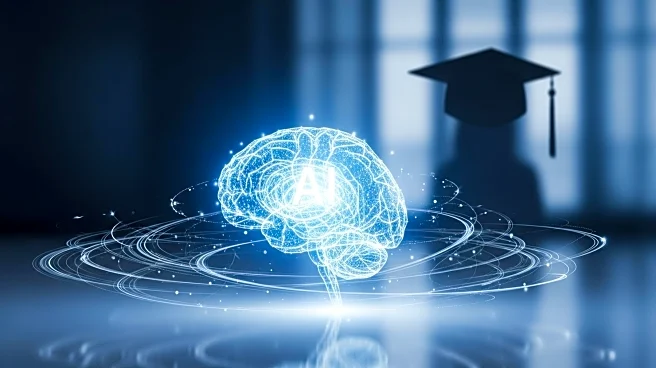What's Happening?
As AI adoption accelerates, many businesses are reducing new graduate hiring, citing AI as a key factor. This trend is contributing to higher unemployment rates among recent college graduates in the U.S., which currently stand at nearly 6%, surpassing the national average. The shift is seen as a result of companies prioritizing AI over developing young talent, potentially leading to a loss of corporate identity and innovation. Experts argue that businesses need to focus on creating hybrid roles where humans are augmented by AI, rather than replacing entry-level positions with AI solutions. This approach involves rethinking career pathways and fostering environments where employees can transition into new roles that emerge from AI integration.
Why It's Important?
The reduction in hiring new graduates due to AI adoption has significant implications for the U.S. workforce and economy. It risks creating a gap in the talent pipeline, which could hinder long-term business success and innovation. By not investing in young talent, companies may lose their competitive edge and become 'faceless' entities. Moreover, the trend could exacerbate unemployment rates among young professionals, affecting their career prospects and economic stability. Businesses that fail to adapt their talent development strategies may struggle to attract and retain the brightest minds, ultimately impacting their growth and market position.
What's Next?
To address these challenges, companies are encouraged to develop comprehensive reskilling programs that focus on reinventing roles in an AI-native enterprise. This includes creating career pathways that allow employees to move into new roles facilitated by AI adoption. Additionally, fostering a culture of experimentation and establishing clear governance structures for AI-informed decisions are crucial steps. By doing so, businesses can ensure they remain attractive to top talent and are well-positioned to leverage AI for future growth.
Beyond the Headlines
The ethical implications of AI replacing human roles are significant. Companies must balance technological advancement with social responsibility, ensuring that AI adoption does not lead to widespread job displacement. Furthermore, the integration of AI into the workforce raises questions about accountability and the role of human expertise in decision-making processes. As AI continues to evolve, businesses will need to navigate these complex issues to maintain trust and credibility with both employees and customers.









